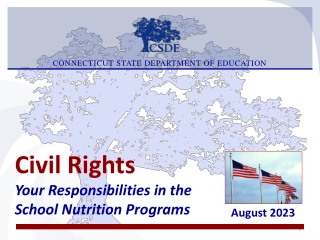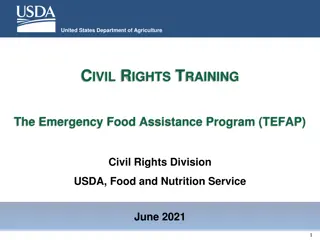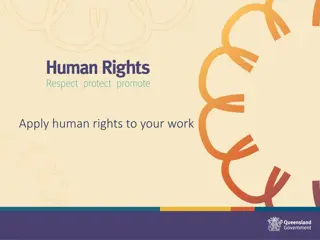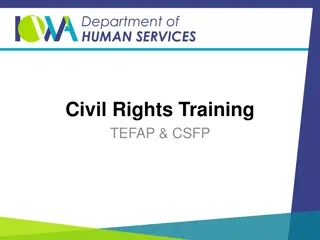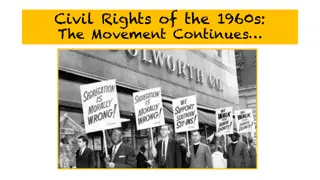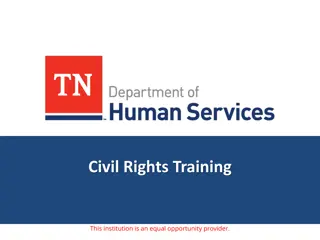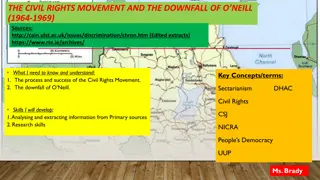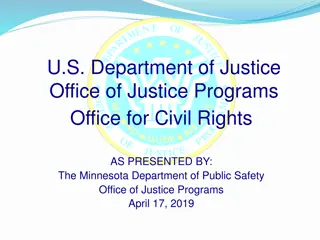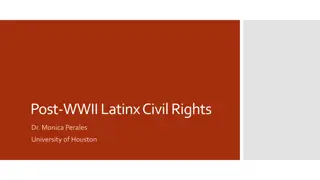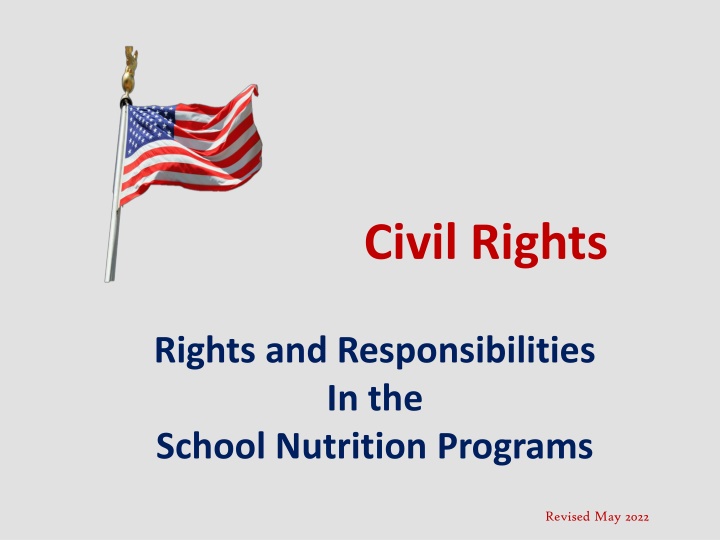
Civil Rights and Responsibilities in School Nutrition Programs
Explore the essential aspects of civil rights in school nutrition programs, including the rights and responsibilities of sponsors, agencies, and staff members. Learn about discrimination, training requirements, goals of civil rights, and key legislation shaping this important area of governance.
Download Presentation

Please find below an Image/Link to download the presentation.
The content on the website is provided AS IS for your information and personal use only. It may not be sold, licensed, or shared on other websites without obtaining consent from the author. If you encounter any issues during the download, it is possible that the publisher has removed the file from their server.
You are allowed to download the files provided on this website for personal or commercial use, subject to the condition that they are used lawfully. All files are the property of their respective owners.
The content on the website is provided AS IS for your information and personal use only. It may not be sold, licensed, or shared on other websites without obtaining consent from the author.
E N D
Presentation Transcript
Civil Rights Rights and Responsibilities In the School Nutrition Programs Revised May 2022
Civil Rights for Child Nutrition Program Sponsors Local agencies are responsible for training their sub recipients, including frontline staff who interact with applicants or participants on an annual basis. New employees, including volunteers, before participating in Program activities All staff should receive training on all aspects of civil rights compliance; Staff should be able to identify a civil rights complaint if received and know what to do if they receive a complaint; Understand that it is the basic right of the individual to file a complaint.
State agencies are responsible for training local agencies on an annual basis. Specific subject matter required, but not limited to: Collection and use of data; Effective public notification systems; Complaint procedures; Compliance review techniques; Resolution of noncompliance; Requirements for reasonable modifications or persons with disabilities; Requirements for language assistance; Conflict resolution; and Customer service.
Definitions Civil Rights: personal liberty or fair and equitable treatment of all customers and employees by the US Constitution and Acts of Congress. Discrimination: Different treatment which makes a distinction of one person or a group of persons from others; either intentionally, by neglect, or by the actions or lack of actions
Goals of Civil Rights To eliminate barriers that prevent or deter people from receiving benefits of a government sponsored/funded program. To provide equal treatment in the delivery of programs and services to all applicants, participants and beneficiaries of a federal program. To ensure that all applicants and participants understand their rights and responsibilities. To show respect and dignity to all.
Civil Rights Legislation Title VI of the Civil Rights of 1964 Civil Rights Restoration Act of 1987 Sections 504 & 508 of the Rehabilitation Act of 1973 & Americans with Disabilities Act (ADA) 1990 and the ADA Amendments Act of 2008 Title IX of the Education Amendments of 1972 Age Discrimination Act of 1975
Protected Classes What is a protected class? A protected class refers to any person or group of people who have characteristics for which discrimination is prohibited based on law, regulation or an executive order. Protected Classes in the School Nutrition Programs: Race identity Color National origin Sex (including gender and sexual orientation) Age Disability
Your Responsibility Outreach and Education Ensuring Equal Access to the Program Collection of Racial and Ethnic Data Reasonable Modifications Language Assistance Issue Resolution Program Matters Civil Rights
Outreach and Education Program Availability: sponsors must take specific actions to inform the public of their program rights and responsibilities and the steps necessary for participation. Complaint Information: applicants and participants must be advised of their right to file a discrimination complaint, how to file a complaint and the complaint procedures. Nondiscrimination Statement: all informational materials and sources, including Web sites used by sponsors to inform the public about Child Nutrition Programs, must contain the appropriate USDA nondiscrimination statement. (Common finding)
Outreach and Education Nondiscrimination statement must be included on all public materials referencing USDA programs And Justice For All Poster: Display in prominent area for all to view Posters are available free of charge from NYSED Version AD-475-A
Nondiscrimination Statement In accordance with federal civil rights law and U.S. Department of Agriculture (USDA) civil rights regulations and policies, this institution is prohibited from discriminating on the basis of race, color, national origin, sex (including gender identity and sexual orientation), disability, age, or reprisal or retaliation for prior civil rights activity. Program information may be made available in languages other than English. Persons with disabilities who require alternative means of communication to obtain program information (e.g., Braille, large print, audiotape, American Sign Language), should contact the responsible state or local agency that administers the program or USDA s TARGET Center at (202) 720-2600 (voice and TTY) or contact USDA through the Federal Relay Service at (800) 877-8339. To file a program discrimination complaint, a Complainant should complete a Form AD-3027, USDA Program Discrimination Complaint Form which can be obtained online at: https://www.usda.gov/sites/default/files/documents/USDA-OASCR%20P- Complaint-Form-0508-0002-508-11-28-17Fax2Mail.pdf, from any USDA office, by calling (866) 632-9992, or by writing a letter addressed to USDA. The letter must contain the complainant s name, address, telephone number, and a written description of the alleged discriminatory action in sufficient detail to inform the Assistant Secretary for Civil Rights (ASCR) about the nature and date of an alleged civil rights violation. The completed AD-3027 form or letter must be submitted to USDA by: 1. mail: U.S. Department of Agriculture Office of the Assistant Secretary for Civil Rights 1400 Independence Avenue, SW Washington, D.C. 20250-9410; or 2. fax: (833) 256-1665 or (202) 690-7442; or 3. email: program.intake@usda.gov This institution is an equal opportunity provider.
Notifying the Public of Program Benefits and Requirements
Effective Public Notification Systems All FNS assistance programs must include a public notification system. The purpose of this system is to inform applicants, participants, and potentially eligible persons of the program availability, program rights and responsibilities, the policy of nondiscrimination, and the procedure for filing a complaint.
Methods of Public Notification And Justice For All Poster Inform potentially eligible persons of programs Provide appropriate information Nondiscrimination statement Convey message of equal opportunity
Basic Elements of Public Notification The public notification system must include the following three basic elements: Program Availability Complaint Information Nondiscrimination Statement
Public Notification Must include information on: Eligibility Benefits & Services (i.e. free or reduced price school meals and snacks) Program availability (location of local facilities or service delivery points, hours of service) Applicant rights and responsibilities Procedures for filing a complaint Non-discrimination policies Any programmatic changes (i.e. changing location of a meal site)
Other Things to Consider To convey the message of equal opportunity reflect diversity and inclusion in all program or program-related information, photos and graphics.
Racial and Ethnic Data The State agency must establish a system for collecting and maintaining racial or ethnic participation data. Recording the racial or ethnic identification of applicants and participants may include the utilization of self- identification where a written application is required. Other methods of recording such data may include card files, rosters, logbooks, or any written record used by local agencies or other subrecipients. (FNS Instruction 113-1, Appendix B) *
Importance of Data Collection Purpose: To determine how effectively FNS programs are reaching potentially eligible persons and beneficiaries As a means of monitoring civil rights compliance, state agencies shall establish a system for the collection of racial/ethnic data of each person applying for and receiving benefits. Applicants shall be assured that the information is required for and used for statistical purposes only and has no effect on eligibility criteria.
Racial and Ethnic Data This data must be kept for three years plus the current year in a secure and confidential manner. Access restricted to only authorized personnel.
Race and Ethnicity Categories Ethnicity (collected first, only select one) Hispanic or Latino Not Hispanic or Latino Race (one or more of the following) American Indian or Alaskan Native Asian Black or African American Native Hawaiian or Other Pacific Islander White
Reasonable Modifications Disability: Any person who has a physical or mental impairment which substantially limits one or more major life activities, has a record of such an impairment, or is regarded as having such an impairment.
Reasonable Modifications Food substitutions and modifications must be made for students with disabilities if: A physician s statement is on file that describes the participant s disability and the physician has indicated the substitutions or modifications that the participant needs. Providing appropriate modifications not ferreting out whether the child has a disability or any possible abuse of the process is the primary objective
Reasonable Modifications Consider: Three essential components: The food to be avoided (allergen) Brief explanation of how exposure to the food affects the child Recommended substitute(s)* The disability/condition does not need to be "named". Rather only the three areas noted above need to be included in the request. "Describe" could be misconstrued to mean "list" or "identify". Reference the USDA s Accommodating Children with Special Dietary Needs in the School Nutrition Programs for more information. (available on the Child Nutrition Knowledge Center website)
Reasonable Modifications As programs and offices modernize, it is imperative that websites, including State and local agency websites, and online application systems are readily accessible to and useable by persons with visual impairments and other disabilities. In addition, programs must ensure physical accessibility for buildings and facilities, particularly to persons in wheelchairs and with mobility disabilities. At times, different or special treatment may actually be necessary in order to ensure effective aids, benefits, and services are reasonable.
Reasonable Modifications There is also an obligation to ensure that members of the public are provided accommodations in order to access program information, applications and assistance (i.e. Braille, large print, and audio tape) Providing qualified Sign Language interpreters for persons with hearing disabilities may be necessary to be able to adequately communicate with these applicants and participants.
Language Assistance Individuals who do not speak English as their primary language and who have a limited ability to read, speak, write, or understand English. Recipients of Federal financial assistance have a responsibility to take reasonable steps to ensure meaningful access to their programs and activities by persons with Limited English Proficiency (LEP).
Factors to consider with LEP: The number or proportion of LEP persons eligible to be served or likely to be encountered within the area serviced by the recipient . Frequency with which LEP individuals come in contact with the program. Nature and importance of the program, activity, or service provided by the program. Resources available to the recipient and costs. Title VI and its regulations require State agencies, local agencies, or other sub recipients to take reasonable steps to assure meaningful access to the information and services they provide. (FNS Instruction 113-1, Section VII)
Determining Reasonable Steps The number or proportion of LEP persons eligible to be served or likely to be encountered within the area serviced by the recipient . The greater the number = the higher the need Frequency with which LEP individuals come in contact with program Nature and importance of program, activity, or service Will denial of service cause a serious or life- threatening implication for potential participants? Resources available to the recipient/costs Accessibility of a translator for applications, etc. Availability of materials in various languages
Language Translations for Program Materials Make School Meal Programs information available to all persons in their language Provide informational materials in the appropriate translation concerning the availability and nutritional benefits of the meal programs The Free and Reduced Student Meal Application is available in English on the ODE, OCN Website. The application is available in a multitude of languages on the USDA Food and Nutrition Service website www.fns.usda.gov/cnd/FRP/frp.process.htm
LanguageInterpreters Children should not be used as interpreters Volunteers may be used, but should understand ethics for using interpreters, if competent and qualified in the language Example: Spanish teacher could assist a household in completing an application but would need to be trained on the importance of keeping all information received from the household confidential See www.lep.gov for more information and resources
Conflict Resolution Resolve at the earliest opportunity If third party needed: Food & Nutrition Service Mediation Program 703-305-2215
Customer Service All students must be allowed equal opportunities to participate in the School Meal Programs regardless of race, color, national origin, sex, age or disability. All participants must be treated in the same manner (i.e. seating arrangements, serving lines, services and facilities, assignment of eating periods, methods of selection for application approval and verification processes). Your goal is to provide fair and equitable treatment to every employee and customer
Equal Access for All You must administer programs so that they are accessible to all participants regardless of race, color, national origin, sex, age, or disability.
Complaint Procedures All civil rights complaints shall be accepted and forwarded to the Office of the Assistant Secretary for Civil Rights. The complainant must file complaint within 180 days from act of discrimination. Complaints may be written, verbal, or anonymous; State agencies or local agencies may develop their own complaint forms, but the use of such forms cannot be a prerequisite for acceptance of a complaint as the use of a complaint form is not required. All complaints must be forwarded to USDA FNS. FNS must investigate complaints within 180 days.
Complaint Procedures Be sure to teach you staff on the specific process for a person who asks or presents them with a CR complaint. Your staff needs the guidance on how to actually respond/refer the individual/complaint. We want to ensure prompt processing/referral without any barriers.
Civil rights Complaint Process Complaints should include: Name, address, and telephone number or other means of contacting the person alleging discrimination; The location and name of the organization or office that is accused of the discriminatory practices; The nature of the incident or action or the aspect of program administration that led the person to allege discrimination;
Civil Rights Complaint Process The names, titles, and business addresses of persons who may have knowledge of the discriminatory action. The date(s) during which the alleged discriminatory actions occurred, or if continuing, the duration of such actions. The basis for the alleged discrimination (age, race, color, sex, disability, and/or national origin)
Civil Rights Compliance Areas Assurances Public Notification Racial/Ethnic Data Collection Complaints of Discrimination Compliance Reviews Resolution of Noncompliance Civil Rights Training Limited English Proficiency Disability Access
Compliance Reviews To examine the activities of State agencies, Local agencies, and Sub-recipients To determine their adherence with civil rights as well as program requirements. FNS Civil Rights and Program staff review State agencies. FNS staff and State agencies review local agencies. Local agencies review their sub recipients.
Compliance Reviews There are three types of compliance reviews: 1.Pre-Award Compliance Reviews 2.Routine (Post-Award) Compliance Reviews 3.Special Compliance Reviews
Pre-Award Compliance Reviews These reviews are conducted by the State Agency and are usually done as desk reviews of information provided by applicants in their official application to operate a FNS Federally-assisted program. No Federal funds shall be made available to a State or an institution until a Pre-Award Compliance Review has been conducted and the applicant has been determined to be in compliance with Title VI.
Pre-Approval/Pre-Award Compliance Reviews In accordance with FNS 113-1, FNS & the State agency: Must determine that all State, local agency, or other sub recipient program applicants are in compliance with Civil Rights (CR) requirements prior to approval for Federal financial assistance; Based on a desk or onsite review of CR information provided by the program applicant
Pre-Approval/Pre-Award Compliance Reviews In accordance with FNS 113-1, FNS & the State agency: Pre-approval/pre-award review report must be maintained in the appropriate program files; Program applicants and recipients must provide relevant and current CR information for any applications for approval of specific projects or significant changes in applications for continuation or renewal of assistance; and Additional requirements contained in Appendix B
Routine (Post-Award) Compliance Reviews Component of the FNS Management Review process. These reviews may be conducted jointly or independently by the CR staff. The review examines the activities of State and Local agencies, or other sub recipients to determine that FNS programs and activities are being administered with civil rights requirements. The office performing the review must advise the reviewed entity, in writing, of the review findings and recommendations.
Routine (Post-Award) Compliance Reviews Areas of review: Eligible persons and households have an equal opportunity to participate; Case records should include race or ethnic origin; Offices are displaying the And Justice for All poster in a prominent location; Nondiscrimination statement (NDS); statement to be included in program materials such as application, notices brochures. Ensure websites for all subrecipients contain the full NDS or direct link to the full NDS.
Routine (Post-Award) Compliance Reviews Areas of review (continued): Availability of program information to eligible persons, program applicants and participants; Racial and ethnic data collection, and maintenance for 3 years; Complaint processing; and Training.
Special Compliance Reviews Special Compliance Review may be conducted by the USDA Office of the Assistant Secretary for Civil Rights staff and/or FNS when there are significant Civil Rights concerns which have a direct impact on the delivery of FNS program services and/or benefits, statistical data indicates that a particular minority group is not participating in or benefiting from the Program , reports of noncompliance made by other agencies need to be substantiated or patterns of complaints of discrimination have developed that require follow-up.
Resolution of Non Compliance Noncompliance: A factual finding that any civil rights requirement, as provided by law, regulation, policy, instruction, or guidelines, is not being adhered to by a State agency, local agency, or other sub recipient. Steps must be taken immediately to obtain voluntary compliance.

